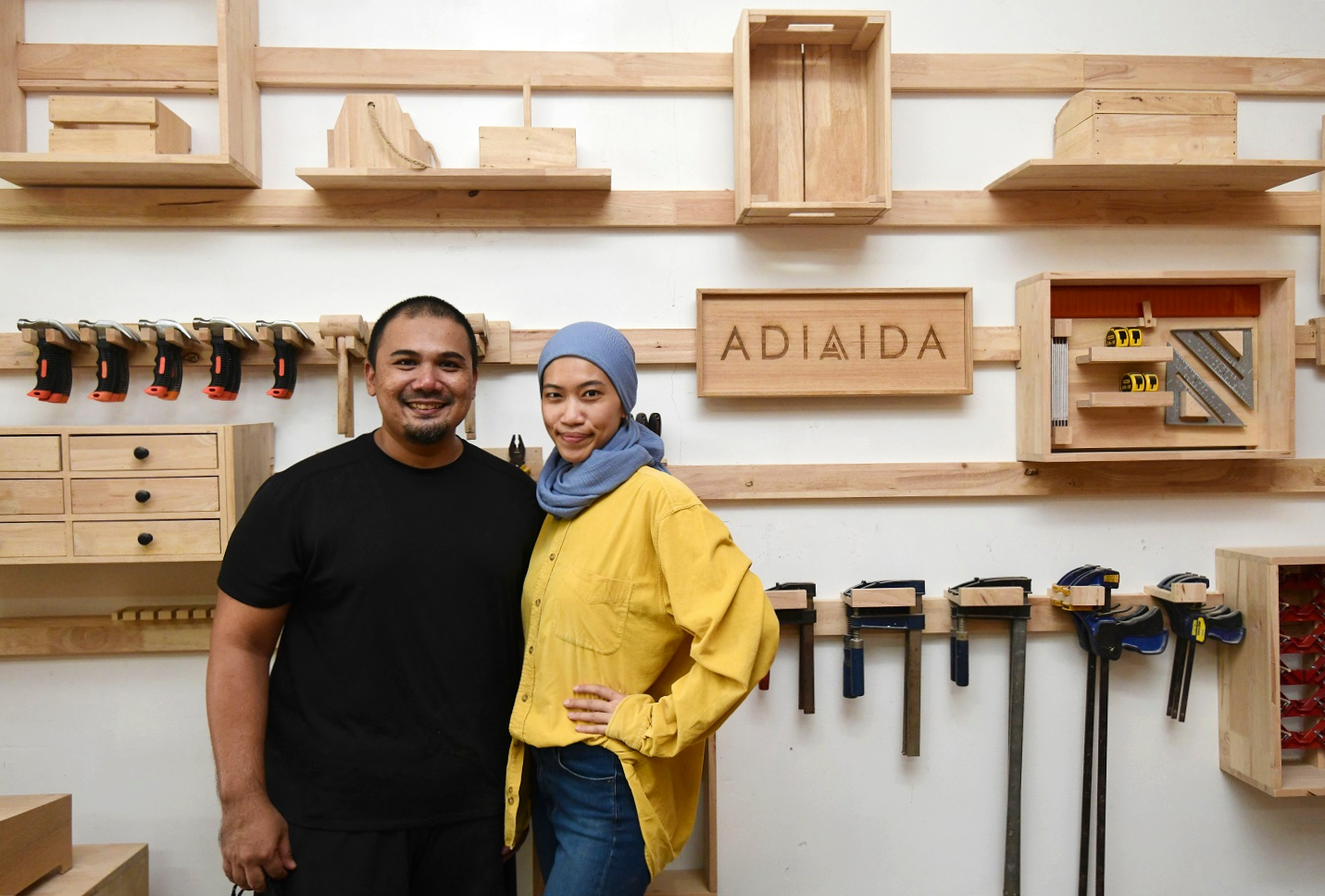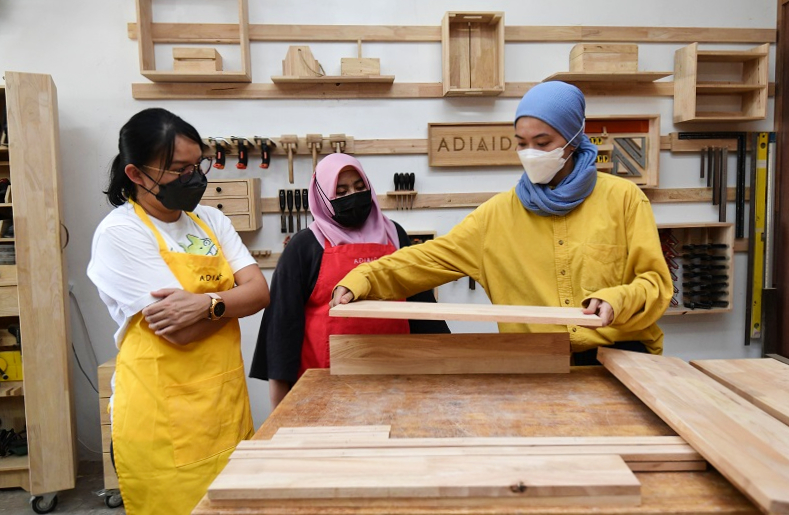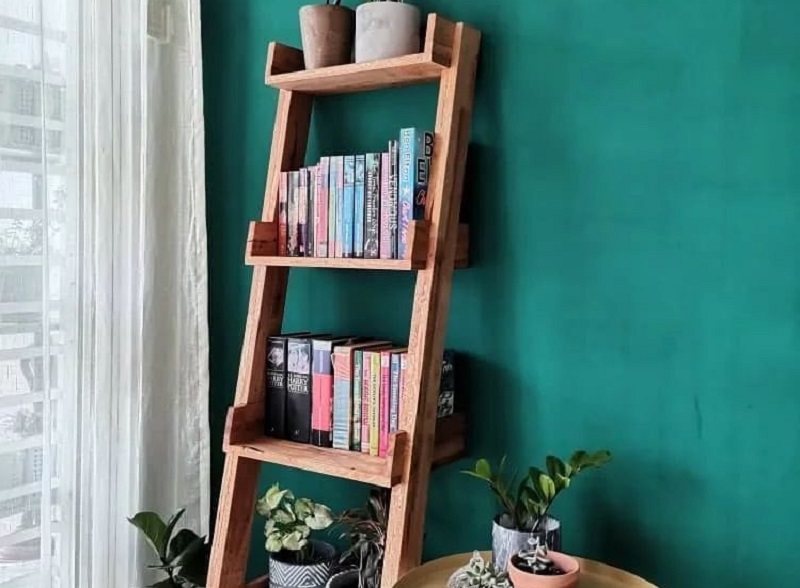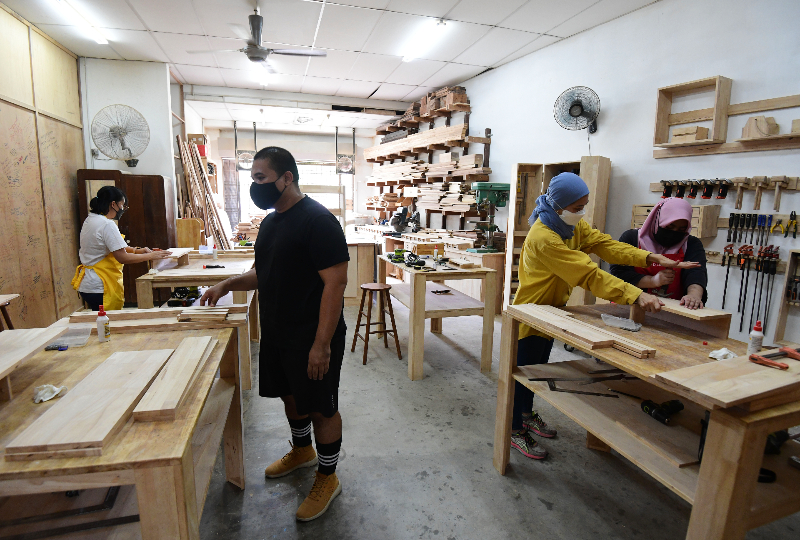
Adiaida is run by husband and wife Adi Kamal and Aida Ihsani (Photo: Patrick Goh/The Edge)
Building and bonding happens when you work with wood. For participants of the women’s woodworking workshop at Adiaida, there is the added thrill of carting home an item they have made, and using it.
Adiaida is run by husband and wife Adi Kamal and Aida Ihsani, who picked up carpentry by watching YouTube videos and believe that with guidance, anyone can build a host of practical items, which last too.
On weekends, their workshop in Ara Damansara, Petaling Jaya, is abuzz with the whirr of saws, hammers knocking nails into place and peals of laughter, as apron-clad women, some with friends, siblings or children, flex arms more used to wielding other gadgets to create racks, cabinets, stools, bookshelves, kitchen trolleys, jewellery boxes, drawers, tables, mobile bars, storage cases and spice racks, among other things.
The business was not planned, says Adi, but it felt like the right thing to do years after meeting Aida on a project while both were engaged with separate non-governmental organisations. She was with Make-A-Wish Malaysia and he, Epic Homes, which constructs housing and shelter for the Orang Asli.
“We built three houses together and on the side, did small DIY projects. One was a drum-like chest for Aida’s mother, for her birthday in 2014,” Adi recalls.
adiaida2.jpg

That kick-started sessions on how to make personal objects at a small space in a friend’s workshop. Then, the head of a private school asked them to set up carpentry classes for its young students. This was followed by training sessions for the teachers as they wanted to include woodwork in the curriculum.
Other jobs came along, including fitting out a whole office for an advertising agency, which they did after their day jobs. When they stepped back to look at their work — a wall shelf with a ladder across, a swing and a pantry — the thought struck them: Why don’t we just do this?
Thus, Adiaida was born in 2019. Excited but careful, its founders allowed the business to grow organically, using their own funds and resources.
“We didn’t want to dump in a lot of money, get loans, buy this and buy that, and be landed with a financial burden. That would create unnecessary pressure as we chase work to recoup. We are comfortable with growing slowly. It’s in line with how we live. We’re not the type to reach for the stars or live in excess,” Adi says.
Even so, the nature of commissioned work is such that some months are tougher than others. After seven years of being business partners, they tied the knot. Working as a couple helped them ride out the pandemic years, especially because they could be fluid about making changes and what to offer clients, depending on the situation. They are also thankful to the community, family, landlords and suppliers, whose support helped them survive.
Now that things are buzzing again, they are busy with ideas and plans for their women’s workshops. Participants walk in wanting to do something with their hands. They leave happy, knowing they can — with proof to show.
“It’s about giving them the space to learn a skill that’s otherwise thought to be male-dominated. There’s no pressure, no prejudice. It’s about women having conversations and connecting with other women. The dynamics would be different if we were to have both sexes together at the sessions,” says Aida.
Having said that, those who enjoyed their classes began commenting, “This would be nice if I could build it with my brother, father, son.” Adiaida listened and started duo workshops.
ezgif.com-gif-maker.jpg

“We’ve had a mum and daughter coming together, a woman with her mother-in-law and another with her sibling.” Recently, they had a father and son on holiday from India who had been looking for such a workshop. “They had some tools back home, but didn’t know how to use it.”
How to do it is the fun part at Adiaida, where many women want to build their own furniture after moving into a new place. Depending on what project they choose to join, everything they need is laid out for them.
Screws, nails, rulers, eraser, pencil, sandpaper and pieces of rubber wood — chosen because they are strong and sustainable — are pre-cut to the required length and width.
Each class is divided into five segments, with Adi and Aida giving instructions and demonstrating how to carry them out. Everyone starts with measuring and layout, and learning to use the drill to make holes. Part three involves nailing the pieces, followed by sanding to smoothen the edges and slabs of wood. The final process is assembling the components.
A cap of four to six participants keeps classes small and personal. There is also the need to space things out as a safety buffer.
What would take a beginner more than a day to build from scratch is completed in four to eight hours at Adiaida, depending on the project. “We don’t want to overwhelm people. We want them to experience the tools first and understand the process,” Adi says. They also hope that as participants get better in class, they will want to develop their skills.
There is also the element of being in the zone with wood and tools, and bonding with fellow participants. Raihan Abu Bakar joined her first class as she wanted to work with her hands after watching many online tutorials on furniture building.
Stefanie Chong Suet Li has attended four workshops, including one with her brother (they built a kitchen trolley) and her seven-year-old daughter, who made a rack. “If children get something too fast, they don’t enjoy the [process] of working hard to get it. I want my daughter to appreciate things and enjoy making them. Her rack may not be perfect, but it’s something she did. She was very proud of it.”
adiaida3.jpg

Adiaida has a catalogue of six to eight projects at any one time, for variety, with sessions open to children as young as five. There are also corporate workshops. “We try to run a project for four to six months before introducing a new one slowly, without phasing out so much. It takes time to learn how to deliver the class too,” says Aida.
Woodworking workshops are available only on Saturday and Sunday as, the rest of the week, the pair conducts sessions for home-school groups. Again, this started organically too, with requests by mothers for their kids. “They saw we had so much fun and they could relive their Living Skills days in school. A lot of them came after we launched our women’s workshops.”
Naturally, some parents are apprehensive about their children handling hammers and saws. “But when they see how we teach them to use real tools, they also want to join in. Kids need to experience this for themselves. They may get hurt; but it’s all part of the learning process,” Adi adds.
This article first appeared on Sept 5, 2022 in The Edge Malaysia.


